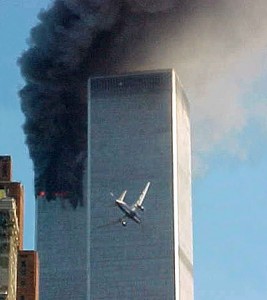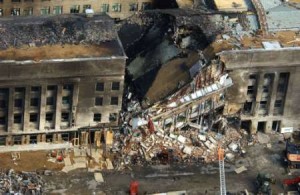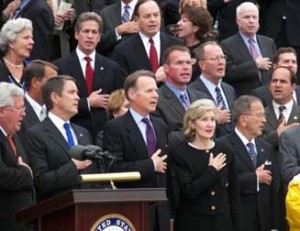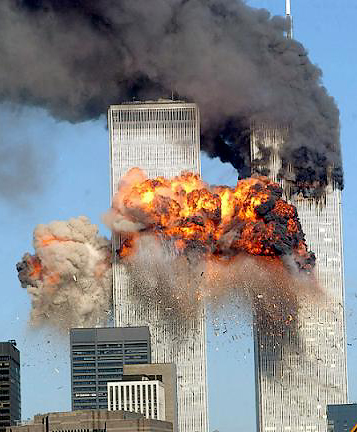On the morning of September 11th, 2001, I was on my way to Patrick Henry College where I was a professor of history. Before arriving at the college, I stopped at a gas station. One of the other customers came up to me and informed me in a rather vague way that a plane had hit a building in New York City. I have to admit that didn’t sound all that bad to me—I assumed it was a small plane, I had no idea it was the World Trade Center, and I had no reason to believe it affected me in any direct way.
 Yet his manner indicated there might be something more to it, so I turned on the car radio to find out if this was anything significant. Reports were sketchy, but I gradually realized it was bigger than I thought. When I got to the college, a prayer meeting already had begun over the incident, but we were largely in the dark about details. One of the problems was that there was no television in any of the rooms where we could watch the drama unfold. Trying to get news on the Internet also was difficult—it seemed to have slowed to a crawl.
Yet his manner indicated there might be something more to it, so I turned on the car radio to find out if this was anything significant. Reports were sketchy, but I gradually realized it was bigger than I thought. When I got to the college, a prayer meeting already had begun over the incident, but we were largely in the dark about details. One of the problems was that there was no television in any of the rooms where we could watch the drama unfold. Trying to get news on the Internet also was difficult—it seemed to have slowed to a crawl.
 My wife was on her way to a store close to Dulles Airport, but she soon grasped the enormity of the situation when all the stores began to close for the day. Of course, the plane that smashed into the Pentagon took off from Dulles that morning. That made it even more real; we used Dulles for our flights all the time. It made our next trip to Dulles for a flight a little more sobering.
My wife was on her way to a store close to Dulles Airport, but she soon grasped the enormity of the situation when all the stores began to close for the day. Of course, the plane that smashed into the Pentagon took off from Dulles that morning. That made it even more real; we used Dulles for our flights all the time. It made our next trip to Dulles for a flight a little more sobering.
I didn’t see any video of the actual events until sometime in the afternoon. Then I was glued to the television for hours. Living just outside the DC area made us feel more vulnerable than if we had been in our home state of Indiana, for instance.
For me, what took place that day was literally an act of war. I recall saying that to my American history class. This really was the modern Pearl Harbor, only worse. Few Americans in 1941 were aware of what Pearl Harbor was and Hawaii was not yet a state. In 2001, everyone knew New York, and the image of the Twin Towers was quite familiar.
Now they were no more—destroyed by an enemy that wanted to take down the one nation that stood in its way as it sought to impose its religious ideology on everyone.
 The unity at the time seemed real. Flags appeared everywhere. Congressmen and senators stood on the steps of the Capitol and sang “God Bless America.” Yet I never was convinced the unity was genuine, and with each passing day that put 9/11 further from our minds, my analysis proved correct.
The unity at the time seemed real. Flags appeared everywhere. Congressmen and senators stood on the steps of the Capitol and sang “God Bless America.” Yet I never was convinced the unity was genuine, and with each passing day that put 9/11 further from our minds, my analysis proved correct.
Rather than viewing this as an act of war, the political Left shifted ground and thought of it as merely a crime to be handled through the judicial system. Today, there is little understanding on the Left of the true nature of the evil that exists in radical Islam. They are more concerned with being sensitive to the extremists and not making them angry.
Here is what the Left needs to understand: they are inherently angry, and nothing we do will satisfy that anger. They will stop at nothing to try to destroy those they hate. And they hate us.
The false ideology that dominates the political Left blinds them to the false ideology that seeks to devour them. I’m reminded of a poignant quote from Whittaker Chambers in his classic book Witness as he tried to warn the society of his day about the evil of communism:
The dying world of 1925 was without faith, hope, character, understanding of its malady or will to overcome it. It was dying but it laughed. And this laughter was not the defiance of a vigor that refuses to know when it is whipped. It was the loss, by the mind of a whole civilization, of the power to distinguish between reality and unreality, because, ultimately, though I did not know it, it had lost the power to distinguish between good and evil. … The dying world had no answer at all to the crisis of the 20th century, and, when it was mentioned, and every moral voice in the Western world was shrilling crisis, it cocked an ear of complacent deafness and smiled a smile of blank senility—throughout history, the smile of those for whom the executioner waits.
Are we at that same place today?
At Southeastern University, where I currently teach, a group of students from the College Republicans planted 2977 American flags in the ground to commemorate those who died on 9/11. It was a moving sight.
Not many people showed up for the remembrance, but those who came felt it deeply. The sad thing is that the new crop of college freshmen has no real significant memories of that day. They were too young to be impacted in the way I was. What does this portend for the future? I will do my part to remind them that an enemy does still exist and that the price of liberty is eternal vigilance. I only hope they are open to that message.


